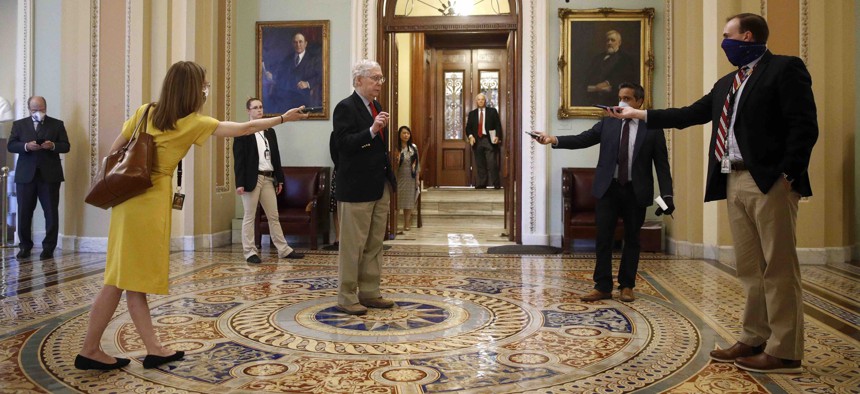Unions Pushing for Billions in State and Local Coronavirus Aid

Senate Majority Leader Mitch McConnell of Ky., center, speaks with reporters, Thursday, April 9, 2020. Senate Democrats on Thursday stalled President Donald Trump's request for $250 billion to supplement a "paycheck protection" program for businesses. AP Photo/Patrick Semansky

Connecting state and local government leaders
Labor groups representing hundreds of thousands of public employees want to see Congress funnel at least another $300 billion to state and local governments.
Public workforce labor unions are among those pushing for hundreds of billions of dollars in flexible state and local aid to be included in the next federal coronavirus relief package.
Lee Saunders, president of the American Federation of State, County and Municipal Employees, outlined the union’s priorities for the anticipated legislation during a call with reporters on Thursday. AFSCME, which says it has about 1.4 million members, is advocating for at least an additional $300 billion of federal support for state and local governments.
“Congress will have to do more in the coming weeks to fund the front lines,” Saunders said.
He described the state and local relief that federal lawmakers have approved so far—upwards of $200 billion, according to Moody’s, including both direct aid and money for education, transit and other expenses—as a “only a downpayment” on what will be needed.
The union, like others, is emphasizing that this funding should be “unrestricted” and available to backfill lost tax revenues—unlike large sums Congress has allotted so far, which states and localities can tap only for specified costs tied directly to the coronavirus response effort.
Saunders says the union is backing other priorities as well, like further expanding unemployment benefits and having the federal government pick up the cost of the so-called “COBRA” health care benefits people turn to when they lose their jobs.
Presumptive Democratic presidential nominee Joe Biden has endorsed the idea of the federal government covering COBRA premiums as part of coronavirus response efforts.
Ensuring that workers have safety gear and that there are other workplace protections to help shield them from exposure to the disease are other issues the union is pressing on, Saunders said.
Mary Kay Henry, president of Service Employees International Union, was also on the call and described some of her union’s lobbying efforts. “Every one of our members is being encouraged to call, write, send a text message or a social media post to their congresspeople,” she said.
SEIU says it represents more than a million local and state government workers, public school employees, bus drivers, and child care providers.
Henry also said that local union leaders in every state were organizing letters to their congressional delegations to reinforce the demands Saunders described. In addition, the unions are holding regular calls with the media to highlight challenges front-line workers are facing.
“I’ve never in my life been in a lobbying effort with the stakes as high as this one,” Henry said.
A new partisan clash broke out in Congress this week over how to move ahead with an “interim” coronavirus package, with Senate Majority Leader Mitch McConnell supporting a measure to provide $250 billion in additional funding for a loan program meant to help small businesses.
On the Democratic side, House Speaker Nancy Pelosi and Senate Minority Leader Chuck Schumer want to see greater protections for underserved businesses in the measure.
They’re also calling for the pending legislation to include $100 billion for hospitals and other health care providers, bolstered food stamp benefits, and $150 billion for state and local governments. Pelosi and Schumer have indicated that this state and local aid would be available for governments to use to “mitigate lost revenue.”
Henry said that union leaders have been having “direct conversations” with Democratic leadership in the House and Senate to voice their priorities for forthcoming legislation.
Saunders said that the union is fine with McConnell’s plan to provide more funding for small business relief, but that providing state and local assistance should be considered an urgent matter as well.
Whether to include the additional state and local funds in the interim bill has turned out to be a “lightning rod” issue, Saunders said, that some lawmakers want to put off addressing until Congress takes up a broader stimulus package that could follow the interim legislation.
“We think this is an issue that needs to be dealt with now,” Saunders added.
States and localities are facing multiple layers of financial pressure as they contend with the virus. There are the unplanned response costs, as well as the prospect of substantial lost revenues due to the economic downturn the disease outbreak has caused.
The Economic Policy Institute, a left-leaning think tank with ties to organized labor, says its estimates show that the federal government will need to provide roughly $500 billion more in state and local aid by the end of 2021.
This sum, EPI says, is what’s needed “to keep state and local governments from becoming a significant drag on economic recovery after the public health crisis passes.”
Thea Lee, EPI’s president, said that one straightforward way to provide this support would be for the federal government to pick up an increased portion, or perhaps all of, the Medicaid expenses that are normally shared with states.
“It is really important that these funds not be restricted so that the state and local governments have the maximum flexibility to replace lost revenues and also meet urgent needs,” Lee added.

NEXT STORY: How to Keep a Remote Workforce Engaged





